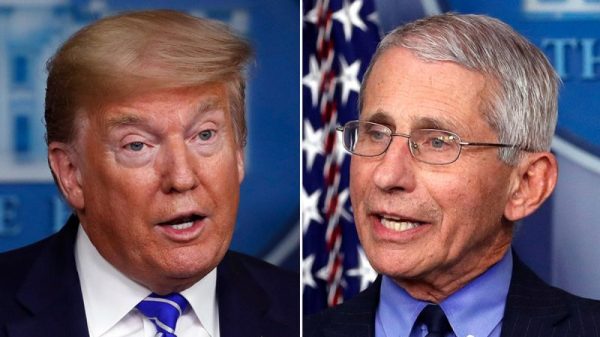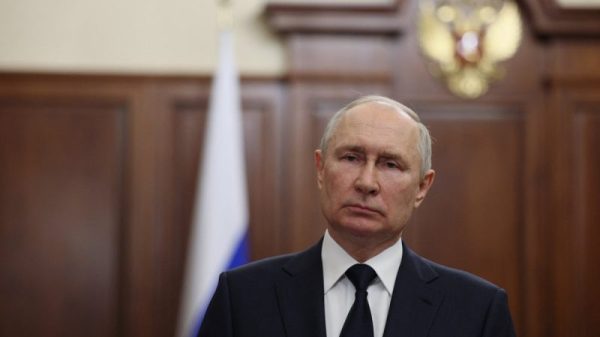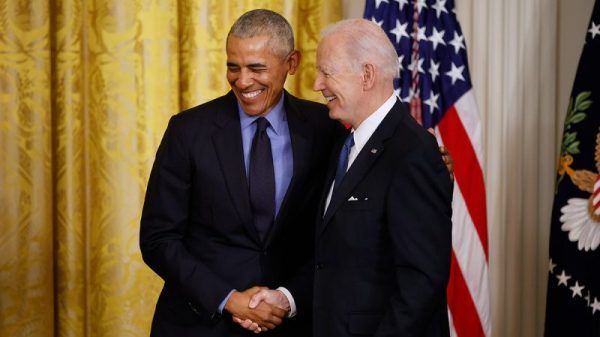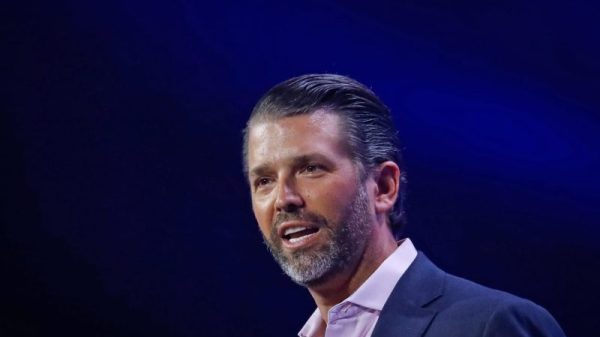Florida Gov. Ron DeSantis entered the Republican presidential race with an unmatched war chest and a $269 million plan to change how campaigns are usually funded.
His first campaign manager, Generra Peck, developed the strategy and selected the leadership to lead a massive new super PAC called Never Back Down. Lawyer-supervised meetings between the campaign-in-waiting and the super PAC’s team fine-tuned the mission — setting the stage for a historic paid door-knocking effort in early states.
Under campaign finance rules, the two operations could not privately coordinate most of their spending. But they aimed to function as an integrated whole — built with the candidate’s approval, advised by a single law firm, overseen by a board that included DeSantis confidants and seeded with $82.5 million that DeSantis had raised for his gubernatorial reelection. It was the first time a major campaign ceded so much of its operations to an entity it could not legally control.
With just weeks to go before the Iowa caucuses, the experiment is now in tatters. The super PAC that funded almost all of the DeSantis advertising and field programs and much of the candidate’s travel and events has been sidelined by the people that created it.
On Saturday night, about four hours after this story first published online, Jeff Roe — a key architect of Never Back Down’s strategy — joined a string of departures, announcing he was resigning and further deepening the group’s tumult. He said he “cannot in good conscience stay affiliated with Never Back Down’ after the super PAC sent statements to The Washington Post suggesting the group fired officials connected to Roe’s firm over “mismanagement and conduct issues.”
“They are not true and an unwanted distraction at a critical time for Governor DeSantis. I am resigning my position effective immediately,” he wrote. “Governor DeSantis has been an exceptional governor and I hope he will be the 47th President of the United States. I wish the Governor, First Lady, and their entire team the best through the rest of the campaign.”
Five other senior officials have left Never Back Down since late November. Three officials with Roe’s firm were fired, and the board chairman and the founding chief executive both resigned, amid internal concerns about legal compliance. A verbal conflict from inside the group’s Atlanta offices became public, as did DeSantis’s own misgivings about the outside group’s leadership. The governor and his campaign staff have been frustrated by reporting on the drama around Never Back Down and critical of the group’s ad strategy, with DeSantis’s second campaign manager, James Uthmeier, publicly instructing donors to give elsewhere for TV ads.
Rather than a new playbook for presidential campaigns, the broader DeSantis project has exposed the dangers of depending on emerging loopholes in campaign finance law that allow candidates to turn over traditional election efforts to groups that can take donations of any size from corporations or individuals.
“The super PAC model of winning a presidential primary, I think, is staggering, if not on the ropes,” said one DeSantis donor. “And if you’re going to have a successful presidential primary campaign you need to be able to raise hard dollars.”
DeSantis — who has sometimes been criticized as awkward in his public appearances and has struggled to win over new voters all year — is still polling in second place in Iowa, and Never Back Down is running a formidable ground operation in the early states that could provide for a surprisingly strong finish. But he now finds himself in an uphill struggle against the recent momentum of former U.N. ambassador Nikki Haley and the continued dominance of former president Donald Trump.
This account of the struggles of DeSantis and the super PAC supporting him is based on interviews with 22 people involved in the effort, most of whom spoke on the condition of anonymity because they were not authorized to speak publicly and wanted to describe private events.
Some described a troubled structure that allowed people close to the governor to shift the major strategic decisions of the super PAC, often over the objections of the group’s staff. At the same time, others close to DeSantis in Tallahassee blamed the failure of the broader effort on the team of strategists and vendors who had been hired to run Never Back Down. Ultimately, they said, those closest to DeSantis drove the effort to revamp the independent group.
“The professionals are out and DeSantis wants to go into the home stretch with his closest confidants,” said one person familiar with the effort who was not directly involved with either camp. The person added that people in DeSantis’s inner circle want to “go into the final fight with people who are close to [Uthmeier] and closer to the governor.”
Never Back Down is still full of campaign veterans, with Phil Cox — a longtime adviser to DeSantis — rejoining as a senior adviser and others taking on heightened roles. Campaign officials and attorneys have repeatedly said they have adhered to campaign finance laws and have said it is normal for a candidate’s supporters and loyalists to run independent organizations supporting them.
“We’re not going to be distracted by more false narratives coming from unknown sources with harmful agendas,” said DeSantis campaign communications director Andrew Romeo, adding: “We appreciate the independent efforts of our outside partners at NBD as they are building a historic ground game for the fight ahead.”
On Saturday, a top official at Never Back Down elaborated on the firings in a statement that for the first time publicly suggested their rationale. “Following mismanagement and conduct issues, including numerous unauthorized leaks containing false information, senior officials were terminated,” said Never Back Down chairman Scott Wagner. “We don’t have time to indulge false narratives from those with ulterior motives.”
The Post asked employees for a response. A lawyer for the employees then contacted Wagner claiming his assertions were categorically false and he revised his statement, replacing the first sentence with: “Following some opinions regarding mismanagement and conduct issues, including some who believed there appeared to be numerous unauthorized leaks containing false information, NBD and some senior officials parted ways. ”
A representative for the three former employees declined to comment Saturday.
Three people familiar with the super PAC’s decision-making described reasons for suspecting the three fired officials of wrongdoing, but the organization did not provide clear evidence implicating them. Two other people familiar with the inner workings of the group said they are not aware of proof.
Few candidates had appeared better positioned for a presidential campaign than DeSantis was after the 2022 midterm elections. He had won reelection in a once-purple state by 19 points, even as candidates backed by his chief rival, Trump, lost statewide races around the country.
DeSantis’s reelection had been managed by Peck, who had retained tens of millions in unspent campaign funds that could not be directly used by a federal candidate. In the weeks that followed, she set about building an operation that could leverage that money and millions more that they believed donors would fork over to the DeSantis effort.
Peck was among those who supported hiring Roe, the chairman of the largest Republican consulting firm, Axiom, to run the super PAC in part because of his experience in Iowa, according to people with knowledge of her thinking. Roe had overseen Texas Sen. Ted Cruz’s 2016 Iowa caucuses victory and was working for Virginia Gov. Glenn Youngkin, DeSantis’s potential rival for the 2024 nomination.
Roe, who had auditioned for other candidates including Trump and businessman Vivek Ramaswamy, agreed to sign on with DeSantis and not to let parts of his firm work for any other presidential candidates. Chris Jankowski, a Republican strategist brought in to helm Never Back Down, was given the task of hiring the rest of the team and he later hired a number of other Axiom consultants. Peck did not want Axiom to become the dominant force in Never Back Down, the people said. Some in DeSantis’s orbit questioned in particular how Roe — a larger-than-life political figure who often drew media attention — would mesh with the governor’s operation.
The structure created separation between the two teams. As DeSantis struggled, people around DeSantis soon began to blame Never Back Down for the larger problems.
“The team in Tallahassee could not understand how NBD’s staff could not forfeit their own brand and desire for control. It was like men are from Mars, women are from Venus during the first months of the campaign,” said a person with knowledge of the campaign’s thinking.
Another person close to the campaign suggested the problem was not the super PAC model itself but divisions among operatives who don’t all “wear the same jersey.” The Never Back Down team — which had been told by Roe to not wear Axiom-branded apparel around the office — came to believe they were being blamed for the campaign’s failures, both in budgeting and the candidate’s message.
Suggestions by some in the DeSantis orbit that they were cashing in on the race also stung, according to people familiar with Never Back Down, as the early margins for Roe and his Axiom colleagues had been kept low, according to people familiar with the super PAC. By the end of June, Roe had taken a personal loss on the project, though his firms were expected to make money in the second half of the year. (In federal filings, he reported a $409,000 in-kind donation to Never Back Down for unreimbursed expenses.)
The scope of the group’s field operation — originally designed to include Super Tuesday states like California and Texas — was eventually narrowed to Iowa, New Hampshire and South Carolina. A firm controlled by Roe did the door-knocking in Iowa, while a firm affiliated with Cox, a longtime adviser to DeSantis, took on the contracts in New Hampshire and South Carolina.
The two operations sought other ways to offset costs for the campaign. A company was founded, N2024D LLC, with help from attorneys for the campaign and Never Back Down to pay for a lease of the private plane DeSantis used to travel to events.
People close to DeSantis also made other efforts to use unregulated money, further expanding the complicated and secretive web of groups revolving around the DeSantis campaign. One project raised money through a nonprofit group controlled by Wagner, Faithful and Strong, which does not disclose its donors and had become a major contributor to Never Back Down.
The money was then sent to another nonprofit, Building America’s Future, which according to tax filings had previously been run by Peck, who was a former business partner of Cox. That group spent the money at IMGE — a firm that lists Cox as chairman and DeSantis deputy campaign manager Ethan Eilon as president — to search for potential small-dollar donors. The data that resulted from that effort was controlled in part by IMGE and could then be used by other clients, like the DeSantis campaign, to raise money for the governor directly.
“We don’t discuss vendor contracts, but it is misleading to frame a contract with IMGE as producing data that ‘could be shared’ with the DeSantis campaign. The reality is that IMGE is a business that sells and rents lists to a wide variety of campaigns and organizations,” said a person familiar with BAF’s role in the arrangement.
Faithful and Strong’s contributions to BAF were designated in legal documents as nonpolitical, according to another person familiar with the arrangement. Wagner has denied any improper coordination between groups.
Ad strategy was a source of friction between the campaign and the super PAC as Tallahassee made instructions explicit. An unsigned memo on July 6, published by NBC News, contained sentences in bold that Never Back Down interpreted as marching orders. The memo urged more ad spending in New Hampshire, and a pullback in spending in the Super Tuesday states until a reevaluation of strategy in the fall.
Never Back Down staff, who had been watching Sen. Tim Scott (R-S.C.) and his allies pour millions into early television advertising with little impact, spoke about spending money in August in the expensive Boston media market as being comparable to lighting the funds on fire for media attention. But the spending went ahead anyway. The group spent $2.5 million on Boston television from late July through September.
Campaign officials, on the other hand, came to believe Never Back Down’s TV strategy wasn’t effective, according to another person familiar with the campaign’s thinking, worrying that ads were not running enough to “burn in.” They also thought the super PAC wasn’t doing enough negative ads as DeSantis came under fire from Trump and Haley.
As DeSantis fell in the polls, the tensions only ramped up. DeSantis operatives and the governor himself were especially frustrated by a Roe strategy memo, posted on Axiom’s website, that laid out advice for DeSantis ahead of the first GOP presidential debate and was leaked to the media, drawing ridicule. At the super PAC, there were some concerns that someone in DeSantis’s immediate orbit was trying to embarrass either Roe or Never Back Down. Campaign leadership, meanwhile, suspected upset Never Back Down officials of trying to hurt them.
By the fall, many of the initial assumptions of the DeSantis operation had failed to materialize. Trump had grown stronger on the back of being indicted in four separate cases, despite his avoidance of the debates. And the money that Never Back Down had expected to flood in as the nominating contests approached also became a problem, as some donors began turning elsewhere.
In mid-November, tempers flared the day of a strategy session at Never Back Down’s offices in Atlanta, the first such series of meeting where members of the board and a former DeSantis attorney named David Dewhirst, a close ally of Uthmeier, were present. At one point after Dewhirst had left the room, multiple people familiar with the events said that Roe confronted Wagner about the Building America’s Future prospecting program, which may have diverted potential money for Never Back Down, a clash someone described to NBC News. Others disputed that was the topic of discussion.
Jankowski, the CEO, resigned days later after finding out that Dewhirst had incorporated a group in Tallahassee — called Fight Right — that some on the board wanted to use to pay for ads attacking Haley. In a statement released amid public reporting over the internal discord, Jankowski said that his concerns with the group’s direction went “well beyond a difference of strategic opinion.”
Another board member, former Virginia attorney general Ken Cuccinelli, wrote an email for the record that was leaked to NBC News, describing the “manner in which the Haley hit and its funding appears to be proceeding is exceedingly objectionable to me.” Less than two weeks later, the board chairman, former Nevada attorney general Adam Laxalt, who had often aligned himself with Cuccinelli, resigned, citing family obligations.
Laxalt declined to comment through a spokesperson, and Cuccinelli did not respond to requests for comment.
By the time of Laxalt’s departure, Uthmeier had written a public memo on behalf of the campaign embracing Fight Right for future television ads and describing Never Back Down as a field operation, even though the group at that point had spent more in advertising than any other campaign or group this cycle, according to AdImpact.
By the end of November, the three supervisors overseeing most of the group’s staff — interim CEO Kristin Davison, communications director Erin Perrine and Matthew Palmisano, who oversaw the group’s advance operation — were fired by the board.
“Things have changed with new leadership and the DeSantis mantra of ‘head down, do the work,’ is winning out at the PAC,” said the person with knowledge of the DeSantis campaign’s thinking. Another said logistics and events are “better than ever.”
That is not the consensus view. “Morale at the PAC is low. No one knows who is in charge. People are just trying to get through,” said another person with knowledge of the situation.
“I thought they’d run a lean, mean, caucus-going machine,” said Justin Clark, the deputy Trump 2020 campaign manager. “It hasn’t been a strong machine.”
Still, some in DeSantis’s orbit are holding out hope for a comeback. During his first campaign for governor, DeSantis won despite shaking up his team late in the race.
“Clearly, we are underperforming. Clearly we haven’t lived up to the billing. But I do think this adaptive behavior is going to produce better results in the end,” said Dan Eberhart, a DeSantis donor. “Clearly, Haley has some momentum nationally. Clearly, Trump is lapping the field. But I think he’s got an underdog’s chance at pulling off a humongous upset.”


































